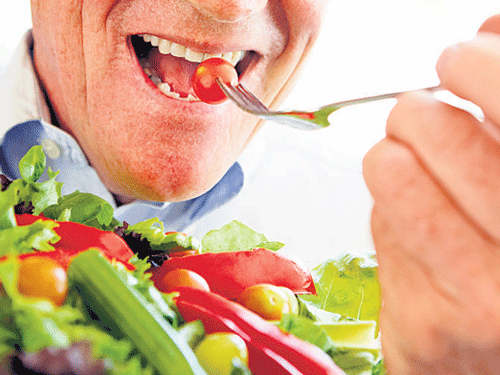With increasing age, our body’s metabolism and energy levels slow down. Dr Anitha Arockiasamy tells you how to brace up to the challenges of old age with the right nutrition.
If I’d known I was going to live this long, I’d have taken better care of myself,” said Eubie Blake, the great ragtime composer and pianist who was still performing at the age of 99, the year before his death. Old age is what lies ahead for everyone and ageing healthily is crucial. Whether you are 40, 50, or even 60, you might not give much thought to the health challenges of ageing. Just as planning for future financial needs is important,
planning for one’s good health is equally imperative. Whatever your age, daily food choices can make an important difference in your health and the way you feel.
The best investment
In our prime years, focusing on career and family takes most of our time and in the midst of this entire mess, one tends to neglect the most important aspect of life - health. With time, age-related ailments like diabetes, blood pressure, weak bones are unavoidable, but by following a routine lifestyle and eating healthy, one can surely avoid such troubles. Investing time and energy on health is the best investment one can make.
When we are in our 20’s, our metabolism and energy levels are high, but they tend to deplete with increasing age. Post 40 years of age, the metabolism and body system undergo many changes, which in turn require a change in diet and lifestyle to ensure a smooth sail into old age. The process of ageing encompasses all the vital organs of the body and even tissues. These changes have a deep influence on the nutritional status ofthe ageing adult and affect the body’s metabolism, nutrient intake, absorption, storage, utilisation and excretion of nutrients, nutrient requirements, and the ability to choose, prepare and eat a variety of foods.
Generally, elder people should avoid heavy meals; instead, consume smaller meals that are light and easily digestible. Old people tend to get dehydrated more often, which makes it important to keep themselves hydrated all through the day. In addition to water, one can even opt for citrus juices without sugar. Processed foods and foods rich in sodium should be sparingly consumed or totally avoided.
Healthy ageing is associated with a number of physiological, cognitive, social and lifestyle changes that influence dietary intakes and nutritional status. Following the basic nutrition guide below can help the elders in maintaining a sound health and live a peaceful life:
Vitamin B12
Vitamin B12 is important for the generation of red blood cells and for maintaining a healthy nerve function. Getting enough B12 is a challenge for older people because they cannot absorb it from the food as efficiently as young people. The richest sources of B12 include fish, meat, poultry, eggs, milk and milk products.
Folic acid
Lack of this essential vitamin is known for contributing to anaemia. Older people whose diets do not include a lot of fruits and vegetables will lack in folic acid.
Calcium
Calcium is important for building and maintaining strong bones. It is so vital that if you do not get enough, your body will leach it out of your bones. Falling short on calcium increases the risk of brittle bones and fractures. Supplement the body with three servings of milk each day and other dairy products. And don’t forget broccoli - a rich source of calcium.
Vitamin D
Vitamin D helps the body absorb calcium, maintain bone density, and prevent osteoporosis. Studies suggest that it may also help fight chronic diseases like cancer, Type one diabetes, rheumatoid arthritis, multiple sclerosis, and autoimmune
diseases. In older people, vitamin D deficiency has also been linked to increased risk of falling. Cereals, milk, yogurts and eggs are good sources of vitamin D.
Potassium
This mineral is vital for cell function, reducing high blood pressure and the risk of kidney stones. Fruits and vegetables are the richest dietary sources of potassium. Banana, prunes, plums and potatoes with their skin are particularly rich in potassium.
Magnesium
Magnesium helps in maintaining the immune system, heart and bones in top shape. Vegetables, fruits, nuts, whole grains, beans and seeds are great sources of magnesium.
Fibre
Fibre helps promote healthy digestion by moving foods through the digestive tract. Whole grains, beans, fruits and vegetables are the best sources of fibre.
Water
With age, our sense of thirst declines.
According to studies, eight glasses of fluids a day are next to physical activity in importance for health. The best sign about whether one is drinking enough is the colour of urine. It should be pale yellow; if it is bright or dark yellow, you may need to drink more liquids through the day.
Start following the basic guidelines and see the changes in you with each passing day. Better late than never, but never late is better!
(The author is president, India Home Healthcare)
